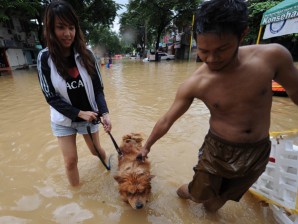Animal lovers’ plea: Don’t leave your pets

Residents guide their pet dog to safety from their flooded home in suburban Manila on August 8, 2012, as the capital city battled deadly floods for a second day. More than a million people in and around the Philippine capital battled deadly floods on August 8 as more monsoon rain fell, with neck-deep waters trapping both slum dwellers and the wealthy on rooftops. AFP PHOTO/TED ALJIBE
Animal lovers have urged compassion for cats and dogs that are now being left behind in the evacuation of their marooned owners.
Amid continuing downpours, the Philippine Animal Welfare Society (PAWS) announced yesterday it was opening its rehabilitation center in Marikina City as a temporary shelter for pets.
“At least the animals won’t drown in our place,” said Anna Cabrera, the group’s program director. “The shelter sits on top of a hill.”
The center is now cramped, but the group said that it would find space for the threatened household buddies in its garage.
PAWS appealed for donations of cages, tarpaulins, towels, food and bottled water for their guests.
Article continues after this advertisementThe plea for compassion came as the government mobilized scant resources to rescue residents trapped by swirling floodwaters.
Article continues after this advertisementBecause there’s no place for pets in rescue vessels, PAWS has launched its own rescue sorties, assisting not only humans and animals, Cabrera said.
PAWS has so far rescued 52 dogs and 243 cats. Nine other dogs and five cats were brought by their owners to the shelter, Cabrera said.
31 SOS requests
She said that PAWS had received 31 SOS requests as of yesterday.
Representative Raymond Palatino of the party-list group Kabataan has filed a bill to include animals in the government’s disaster preparedness and relief plans.
“Indian philosopher Mahatma Gandhi once famously uttered that a nation’s moral progress may be judged by the way its animals are treated. Our nation’s compassion and consciousness for animal welfare is a step in the right direction,” he said.
Animals, especially in rural communities, are a major source of food, income and transportation and account for about 30 percent of total agricultural output, Palatino said.
The state is also duty bound to protect animals under the Animal Welfare Act of 1998, he stressed, noting that PAWS estimates that about 10 percent of households keep a companion animal.
Palatino said that during calamities, many residents of rural communities refuse to leave their livestock, putting their own lives at risk.
The residents would be more willing to seek refuge in safe places if they know that the government has provisions to protect their animals, he said.
“By including animals in disaster preparedness and relief operations, the government saves households means of income and thereby promotes faster recovery from the effects of a calamity,” he said in his bill.
Because their livelihood would be spared from danger, the families would be less reliant on relief goods and would decrease the time they spent in evacuation centers, Palatino said.
Animal welfare is an essential component of sustainable development, according to Palatino, who added that the humane treatment of animals stand to benefit humans.